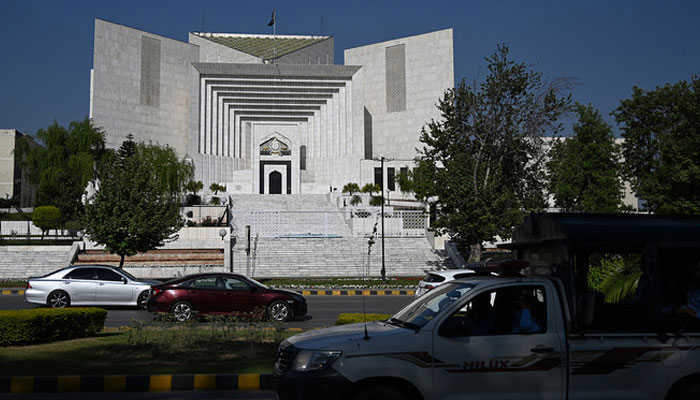A messy situation
The judiciary, on the other hand, maintains that it is merely delivering justice
The ongoing showdown between the executive and the judiciary has entered a new – messier and more dangerous – phase with National Assembly Speaker Ayaz Sadiq’s recent letter to the Election Commission of Pakistan (ECP), challenging the implementation of the Supreme Court’s ruling on reserved seats. This move, alongside a similar letter from Punjab Assembly Speaker Malik Muhammad Ahmad Khan, signals a deepening defiance by the government towards the judiciary. At the heart of the conflict lies the Election (Second Amendment) Act, 2024, which the government claims must be applied to the allocation of reserved seats, effectively bypassing the Supreme Court’s earlier ruling in favour of the PTI’s claim to these seats. Legal experts are unanimous in their view: the National Assembly speaker has no authority to direct the ECP in a manner contrary to the Supreme Court’s ruling. The constitution is clear: the judiciary’s interpretation of the law cannot be undone through ordinary legislation. Yet, the government’s defiance speaks to a larger issue: a growing institutional clash that threatens to destabilize Pakistan’s fragile democracy.
This is not just a battle over a few parliamentary seats. The government, supported by the powers-that-be, views the judiciary’s decisions as favourable to the PTI and labels them as judicial activism. The judiciary, on the other hand, maintains that it is merely delivering justice. This widening gap between the branches of government is escalating into a power struggle over who controls the political narrative and, by extension, the country’s future. Observers have pointed out that the situation is markedly different from previous confrontations between the judiciary and elected governments. Whether during the PPP tenure under CJ Iftikhar Chaudhry or the PML-N’s experience with CJ Saqib Nisar, Supreme Court verdicts were followed, however reluctantly. What’s changed now? The answer lies in the crumbling relationship between the judicial establishment and the other establishment, a bond that had previously ensured some degree of institutional cohesion. The hybrid system, with its murky power-sharing arrangements, has exposed a fracture that now sees parliament taking unprecedented steps to undermine judicial authority.
The revised party position list issued by the National Assembly, excluding the disputed reserved seats, further fuels suspicions that the government intends to neutralize the PTI’s political influence. The absence of PTI-backed MNAs from this list suggests a deliberate attempt to sideline the former ruling party and prevent it from reclaiming lost ground. This isn’t just about parliamentary arithmetic; it’s about the survival of the current political order, which increasingly views the judiciary as an adversary rather than a partner in governance. What this growing tension makes abundantly clear is that Pakistan’s democratic institutions are on a collision course. The judicial branch finds itself at odds with an executive and legislature that appear more interested in consolidating power than in preserving democratic principles. And caught in the crossfire are the people of Pakistan, whose faith in democratic governance is already worn thin.
As legal experts warn of a constitutional breakdown, it is imperative to recognize the long-term damage this struggle is inflicting on the country. Parliamentary sovereignty is a cornerstone of democracy, but it cannot be wielded to erode the independence of the judiciary. Both institutions must operate within their constitutional limits, lest Pakistan’s fragile democratic experiment crumbles under the weight of institutional ego. The ultimate casualty in this power struggle is democracy itself. The more parliament and the government challenge the writ of the judiciary, the more they erode the very principles of accountability, transparency, and justice that form the bedrock of democratic governance. Pakistan has weathered such storms before, but with each clash, the institutions that are meant to protect democracy become weaker, leaving the people to pay the price for political brinkmanship. If this confrontation continues, the damage may be irreversible.
-
 Kash Patel Fires FBI Officials Behind Trump Mar-a-Lago Documents Probe, Reports Say
Kash Patel Fires FBI Officials Behind Trump Mar-a-Lago Documents Probe, Reports Say -
 Martin Short's Daughter Katherine's Death Takes Shocking Turn As Terrific Details Emerge
Martin Short's Daughter Katherine's Death Takes Shocking Turn As Terrific Details Emerge -
 Patrick Dempsey Reacts To Tragic Death Of His 'Grey's Anatomy' Co-star Eric Dane
Patrick Dempsey Reacts To Tragic Death Of His 'Grey's Anatomy' Co-star Eric Dane -
 Sidney Crosby Injury News Shakes Penguins After Olympic Tournament
Sidney Crosby Injury News Shakes Penguins After Olympic Tournament -
 Yankees Honour CC Sabathia With No. 52 Retirement This September
Yankees Honour CC Sabathia With No. 52 Retirement This September -
 Cuban Government Says Boat Full Of Armed Men Fired On Border Guards, Killing 4
Cuban Government Says Boat Full Of Armed Men Fired On Border Guards, Killing 4 -
 Lily Collins Faces Intense Pressure After Landing Audrey Hepburn Role: Source
Lily Collins Faces Intense Pressure After Landing Audrey Hepburn Role: Source -
 FIFA World Cup Security Concerns Spike After Recent Cartel Violence In Mexico
FIFA World Cup Security Concerns Spike After Recent Cartel Violence In Mexico -
 Shamed Andrew Ordered To Curb Hobby: ‘It’s A Bad Look’
Shamed Andrew Ordered To Curb Hobby: ‘It’s A Bad Look’ -
 Cardi B 'no-nonsense' Move: Why She Distanced Herself From Stefon Diggs? Source
Cardi B 'no-nonsense' Move: Why She Distanced Herself From Stefon Diggs? Source -
 Metallica Announce 2026 ‘Life Burns Faster’ Las Vegas Sphere Residency
Metallica Announce 2026 ‘Life Burns Faster’ Las Vegas Sphere Residency -
 ‘From Dating Scams To Fake Lawyers’: OpenAI Bans ChatGPT Accounts Over Misuse
‘From Dating Scams To Fake Lawyers’: OpenAI Bans ChatGPT Accounts Over Misuse -
 Amy Schumer Reveals She Pushed Through Illness Mid-performance: 'Proud I Made It'
Amy Schumer Reveals She Pushed Through Illness Mid-performance: 'Proud I Made It' -
 Shamed Andrew Can No Longer Take The ‘heat’ Of His Actions
Shamed Andrew Can No Longer Take The ‘heat’ Of His Actions -
 Royals Adamant To Show Andrew Is ‘just One Bad Apple’
Royals Adamant To Show Andrew Is ‘just One Bad Apple’ -
 Jessie Buckley Reveals Why BAFTA Win Felt Extra 'special' With Cillian Murphy
Jessie Buckley Reveals Why BAFTA Win Felt Extra 'special' With Cillian Murphy




